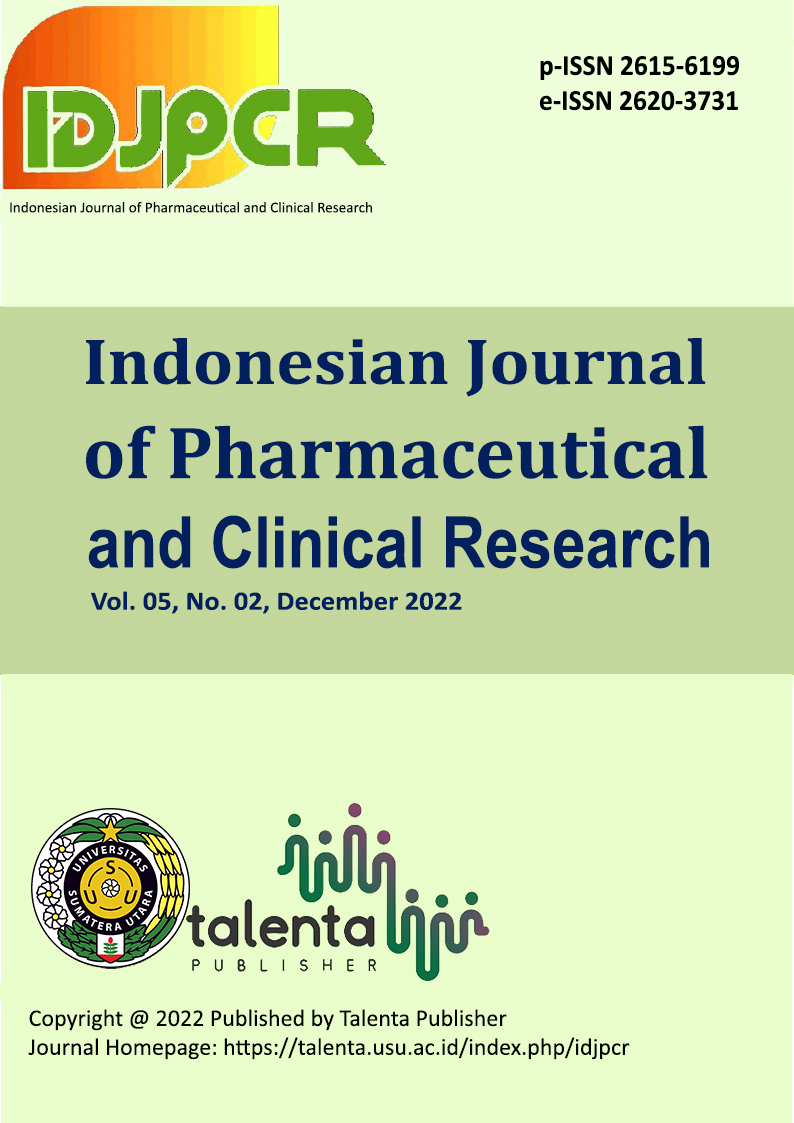Development of Oral Thin Film Strip Contained Ethanol Extract of Clove Leaves (Syzygium aromaticum (L.) Merr. & Perry)
DOI:
https://doi.org/10.32734/idjpcr.v5i2.17919Keywords:
Halitosis, Clove, Syzygium aromaticum (L.) Merr. & Perry, Oral Thin Film Strip, GelatinAbstract
Halitosis or bad breath can occur due to poor oral hygiene care, dental caries or infections in the oral cavity. The use of mouth fresheners is one of the solution product to overcome the problem. Oral Thin Film Strip (OTFS) is an alternative mouth freshener. The preparation of OTFS was carried out using the solvent casting method. Five film formula were made with varying concentrations of gelatin and HPMC, namely F1 (0:3), F2 (1:3), F3 (1:1), F4 (3:1), and F5 (3:0). Evaluation of the preparation included organoleptic test, weight uniformity, thickness, disintegration time, pH, and folding resistance. Stability testing was carried out for 3 months at 25±2°C and 40±2°C. Antibacterial activity test against Streptococcus mutans (S. mutans) on the preparation was done using disc diffusion method. The OTFS preparation produced gave a homogeneous colour, aroma and taste of the extract. The resulting preparation had weight between 0.345-0.180 grams, thickness between 0.148-0.247 mm, disintegration time of 44-60 seconds, a pH between 6.06-6.33, and a film folding resistance between 339.83-673.67 times. The preparation was stable in storage for 3 months at a temperature of 25±2℃ and 40±2℃. The preparation showed antibacterial activity against S. mutans with zone of inhibition between 8.0-9.1 mm. Clove leaf ethanol extract can be formulated into OTFS preparations with good physical characteristics, stable in 3 months storage and had antibacterial activity against S. mutans so that it has the potential to overcome bad breath.
Downloads
References
Usra NF, Alimuddin H, Aisyah AR. Overview of knowledge about the causes of halitosis and its treatment in society (Literature review study). DHeJA: Dental Health Journal of Aceh 2023; 2(1): 23-29.
Suhendar, Usep, Sogandi. Identification of bioactive compounds in clove leaves (Syzygium aromaticum) extract as inhibitor Streptococcus mutans. Jurnal Biologi. 2019;12(2).
Meramis JL, Ratuela JE. Gargling with clove leaves (Syzygium aromaticum) to improving oral and dental hygienen in elementary school children. Journal of Dental Hygiene and Therapy. 2022;3(1): 31-34.
Ramadhani A, Saadah S, Sogandi. Antibacterial effect of clove leaf extract (Syzygium aromaticum) against Escherichia coli and Staphylococcus aureus. Jurnal Bioteknologi & Biosains Indonesia. 2020;7(2): 203-208.
Laila L, Candra A, Permata YM, Prasetyo BE. The influence of Catharanthus roseus (L.) G. Don. ethanol extract in clove oil nanoemulsion: Physical characterization, antioxidant and antibacterial activities. International Journal of Applied Pharmaceutics. 2023; 15(3):254–260.
Abdellatif AO, Mohamed AAA, Seed-Ahmed SS, Said MM, Mohamed NA, Mohammed KA, Alqamar MO. Development of a pharmaceutical formulation containing clove (Syzygium aromaticum) extract for the management of oral candidiasis. Saudi Journal of Biomedical Research. 2023;8: 160-165.
Reveny J, Maha HL, Laila L. A comparative study of phytochemical screening and DPPH radical scavenging activity of Ficus carica Linn. leaves extracts. Tropical Journal of Natural Product Research. 2023;7(2): 2337-2340.
Fajria TR, Nuwarda F. Teknologi sediaan oral lapis tipis terlarut cepat (Fast Dissolving Film). Majalah Farmasetika. 2018;3(3): 58-64.
Dewi WA, Mulya D. Formulasi dan evaluasi sifat fisik serta uji stabilitas sediaan edible film ekstrak etanol 96% seledri (Apium graveolens L) sebagai penyegar mulut. Indonesia Natural Research Pharmaceutical Journal. 2019;4(2): 32-40.
Mahaparale S, Wagh BS. Formulation and evaluation of mouth dissolving film of glycopyrolate. International Journal of Creative Research Thoughts. 2021; 9(9): 511-514.
Tamer MA, Hammid SNA, Ahmed B. Formulation and in vitro evaluation of bromocriptine mesylate as fast dissolving oral film. International Journal of Applied Pharmaceutics. 2018; 10(1): 7-20.
. Ningsih W. Formulasi dan uji efektivitas antibakteri edible film ekstrak biji pinang (Areca catechu Linn.). Jurnal Ilmu Farmasi dan Farmasi Klinik. 2018;15(2): 71-76
Dahiru N, Paliwal R. Phytochemical analysis and antimicrobial properties of Eugenia caryophyllata (Syzigium aromaticum L. Myrtaceae). Journal of Environmental Bioremediation and Toxicology.2021; 4(1): 4-7.
Sari DI, Fitriana MI, Mulyadi RR, Hidayati L. Karakteristik dan uji stabilitas fisik sediaan edible film ekstrak etanol kulit batang kasturi (Mangifera casturi kosterm) berbasis gelatin. Pros Semin Kefarmasian dan Present Ilm. 2017; 8-17.
Zubaydah WOS, Sahumena MH. Fast dissolving oral film salbutamol sulphate by using HPMC polymer. Indonesian Journal of Chemometrics and Pharmaceuticals Analytics. 2021;1(3): 134-136.
Ozakar RSM, Ozakar E. Current overview of oral thin films. Turkish Journal of Pharmaceutical Sciences. 2021; 18(1): 111-121. doi: 10.4274/tjps.galenos.2020.76390
Alfiah RR, Khotimah S, Turnip M. Efektivitas ekstrak metanol daun sembung rambat (Mikania micrantha Kunth) terhadap pertumbuhan jamur Candida albicans. Jurnal Protobiont. Protobiont. 2015; 4(1):52-57.
Downloads
Published
How to Cite
Issue
Section
License
Copyright (c) 2022 Indonesian Journal of Pharmaceutical and Clinical Research

This work is licensed under a Creative Commons Attribution-ShareAlike 4.0 International License.
The Authors submitting a manuscript do so on the understanding that if accepted for publication, copyright of the article shall be assigned to Indonesian Journal of Pharmaceutical and Clinical Research (IDJPCR) and Faculty of Pharmacy as well as TALENTA Publisher Universitas Sumatera Utara as publisher of the journal.
Copyright encompasses exclusive rights to reproduce and deliver the article in all form and media. The reproduction of any part of this journal, its storage in databases and its transmission by any form or media, will be allowed only with a written permission from Indonesian Journal of Pharmaceutical and Clinical Research (IDJPCR).
The Copyright Transfer Form can be downloaded here.
The copyright form should be signed originally and sent to the Editorial Office in the form of original mail or scanned document.









